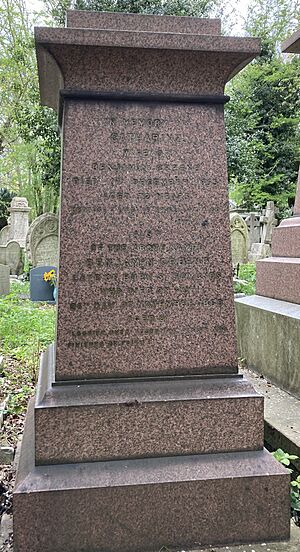Benjamin Greene (brewer) facts for kids
Quick facts for kids
Benjamin Greene
|
|
|---|---|
| Born | 5 April 1780 Oundle, Northamptonshire, England
|
| Died | 26 November 1860 (aged 80) Bloomsbury, London, England
|
| Occupation | Businessman, brewer, planter, newspaper owner |
| Known for | Founder of, Greene King |
| Children | 13 |
Benjamin Greene (born April 5, 1780, died November 26, 1860) was an important English businessman. He started a very large brewing company called Greene King. This company is still one of the biggest in the United Kingdom today. Later in his life, he owned farms in the British West Indies and supported the practice of slavery.
Contents
Benjamin Greene's Life and Work
Benjamin Greene was born in Oundle, England, on April 5, 1780. When he was young, he trained at Whitbread, a large British company.
Starting a Brewing Business
In 1801, Benjamin Greene started his first brewing business with a partner named John Clark. They were in Bury St Edmunds. A few years later, in 1806, he ended that partnership. He then started a new business with William Buck. This new company, located at the Westgate Brewery, eventually became the famous Greene King.
Other Business Ventures
Benjamin Greene also became involved in owning large farms, called plantations, in the West Indies. He gained ownership of these lands after the death of Sir Patrick Blake, who had named Greene as the person in charge of his affairs.
He was also a supporter of the arts. In 1819, he loaned money to help build the Theatre Royal in Bury St Edmunds.
In 1828, Benjamin Greene bought a newspaper called the Bury and Suffolk Herald. As the owner, he held very strong traditional views. He spoke out against important changes happening in Britain at the time. This included new laws about voting rights and the law to end slavery. Because of his strong opinions, he faced a lot of criticism and even lawsuits.
Later Life and Legacy
In 1836, Benjamin Greene moved from Bury St Edmunds to London. There, he started a new business with his son, focusing on trade and shipping in the West Indies.
When slavery was abolished in 1833, the British government paid money to slave owners as compensation. Benjamin Greene received money for the people he had enslaved on his farms in Montserrat and St Kitts. Historians have noted that he was a strong supporter of slavery during this period. In recent years, the company Greene King has recognized its historical connection to slavery. In 2020, they announced plans to support charities that help Black, Asian, and minority ethnic communities.
Benjamin Greene passed away in London on November 26, 1860. He is buried in Highgate Cemetery.
Family Life
Benjamin Greene was married twice. His first marriage was in 1803 to Mary Maling. Then, in 1805, he married Catherine Smith. Together, they had many children—seven sons and six daughters.
Some of his notable children and grandchildren include:
- Benjamin Buck (1808–1902): He became a very important person, serving as the Governor of the Bank of England.
- Edward (1815–1891): He was a politician who served as a Member of Parliament (MP) for Bury St Edmunds. He also took over running the family brewery business.
- William (1824–1881)
- Charles Henry (1865–1942)
- Graham Greene: A famous writer.
- Sir Hugh Greene: A well-known figure in British broadcasting.
- Raymond Greene: A respected doctor.
- Charles Henry (1865–1942)


